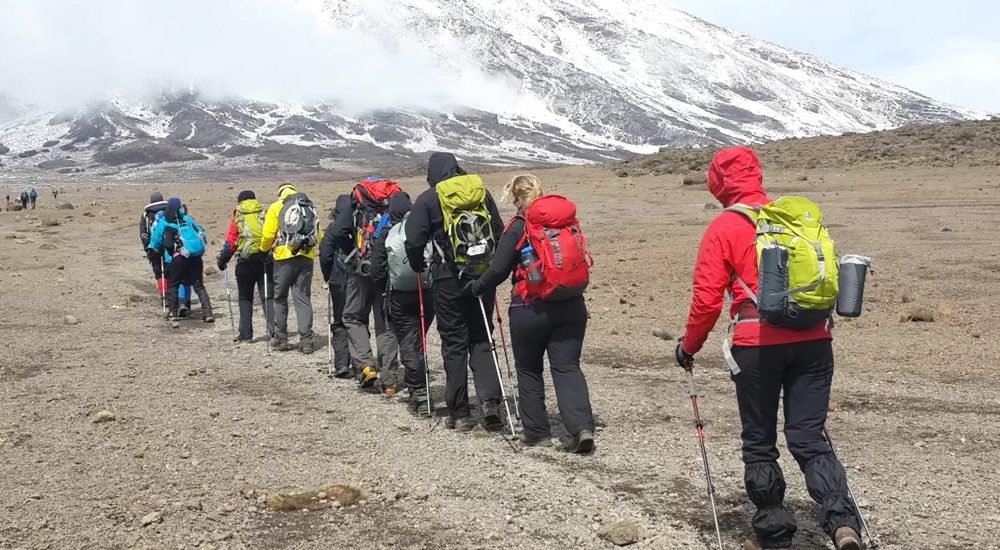
The Rongai route is the only route that approaches Kilimanjaro from the north, close to the Kenyan border. Though gaining popularity amongst climbers, this route still experiences low crowds. Rongai has a more gradual slope than the mountain’s other routes. It is the preferred route for those looking for an alternative to the popular Marangu route, for those who would like a more remote hike, and for those who are climbing during the rainy season (the north side receives less precipitation). Rongai is a moderately difficult route, and is highly recommended, especially for those with less backpacking experience.
Included and Excluded
- Oxygen Cylinder
- Medically qualified guides
- Twice a day medical health check up, monitoring with pulse-oximeter and stethoscope.
- 2 nights hotel in Moshi (before & after climb) BREAKFAST
- Orientation meeting in Moshi and gear check as well.
- Pick up and drop off to the Airport
- Kilimanjaro National Park permits, camping/hut fees, and rescue fees
- 3-4 porters per climber, which includes porters to carry up to 30 lbs of your personal gear.
- 4-season mountain tents, double occupancy.
- Mess tent, tables, chairs, sleeping pad 2.5 inches thick and trekking poles.
- All meals while on the climb + evening tea with popcorn or peanuts.
- As much treated water you can drink while climbing.
- Hot water for washing up daily.
- Airfares and taxes
- Tip to your guides, porters and cook. The recommended for this is $ 20 head guide per day, $ 15 per
- assistant guide per day, $ 15 per cook per day & $ 10 per porter per day. This can be split between each
- Client in the climb.
- Lunch, dinner and drinks at hotel
- Health requirements (Yellow Fever - compulsory depending on how you travel to Tanzania, Meningitis
- & Hepatitis A optional but recommended)
- Personal travel insurance
- Laundry (available at the hotel)
- Items of a personal nature
- Optional travel insurance
- Personal hiking/trekking gear Some gears available for rent
- Snacks and personal medicine
Itinerary
Elevation: 6,398 ft to 9,300 ft Distance: 8 km/5 miles Hiking Time: 3-4 hours Habitat: Rain Forest We drive from Moshi to Marangu Gate for permits before taking a short transfer to the Rongai Gate trailhead. The path winds through corn and potato fields and then climbs gently through the forest which is home to a variety of wildlife, including the black and white colobus monkey.
Elevation: 11,811 ft to 14,160 ft Distance: 5 km/3 miles Hiking Time: 3-4 hours Habitat: Alpine Desert The hike today is short and steep up a grassy slope. Views of the wilderness area are stunning. As we exit the heath zone and emerge into the Alpine Desert zone, the landscape changes dramatically. Our camp is situated beneath the jagged spires of Mawenzi, at Mawenzi Tarn. The remainder of the day can be spent relaxing or exploring the area.
Elevation: 9,300 ft to 11,300 ft to 11,811 ft Distance: 12 km/8miles Hiking Time: 8-9 hours Habitat: Heath We begin this morning with a steady incline up to Second Cave. We continue trekking though moorland, leaving the main trail for a smaller path towards the jagged peaks of Mawenzi, before finally arriving at Kikelelwa Cave for the night.
Elevation: 11,811 ft to 14,160 ft Distance: 5 km/3 miles Hiking Time: 3-4 hours Habitat: Alpine Desert The hike today is short and steep up a grassy slope. Views of the wilderness area are stunning. As we exit the heath zone and emerge into the Alpine Desert zone, the landscape changes dramatically. Our camp is situated beneath the jagged spires of Mawenzi, at Mawenzi Tarn. The remainder of the day can be spent relaxing or exploring the area.
Elevation (ft): 14,160 ft -14,400 ftDistance: 2 km/1 mile Hiking Time: 2 hours Habitat: Alpine Desert This is an extra day meant for acclimatization and can be spent day hiking on Mawenzi Ridge. The unique landscape offers motivating views of Kibo and Mawenzi. After spending a few moments exploring the area we head back to Mawenzi Turn for camp.
Elevation (ft): 14,160 ft to 15,430 ft Distance: 8 km/5 miles Hiking Time: 5-6 hours Habitat: Alpine Desert We climb gradually, then cross the lunar desert of the “Saddle” between Mawenzi and Kibo. Our camp, Kibo Hut, sits at the bottom of the Kibo crater wall. Once here we rest, enjoy an early dinner to prepare for the summit day.
Elevation (ft): 15,430 ft to 19,341 ft Distance: 19 km Hiking Time: 9 -10 hours Habitat: Arctic Very early in the morning (around midnight), we begin our push to the summit. This is the most mentally and physically challenging portion of the trek. The wind and cold at this elevation and time of day can be extreme. We ascend in the darkness for several hours while taking frequent, but short, breaks. At Gilman’s point (18,600 ft), you will be rewarded with the most magnificent sunrise you are ever likely to see coming over Mawenzi Peak. Finally, we arrive at Uhuru Peak- the highest point on Mount Kilimanjaro and the continent of Africa. After spending a few moments taking in the plains of Africa and your accomplishment, we descend to Horombo Hut. Later in the evening, we enjoy our last dinner on the mountain and a well-earned sleep.
Elevation (ft): 12,205 ft to 6,046 ft Distance: 20 km/12 miles Hiking Time: 5-7 hours Habitat: Rain Forest On our last day, we have a long trek mostly downhill through the tropical rainforest. Once at the park headquarters at Marangu gate, we collect our summit certificates. A vehicle will meet us here and drive us back to the hotel in Moshi.
Frequently Asked Questions (FAQ)
Book Your Tour
Reserve your ideal trip early for a hassle-free trip; secure comfort and convenience!


